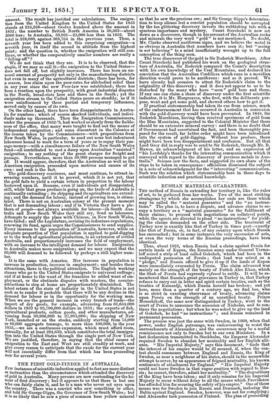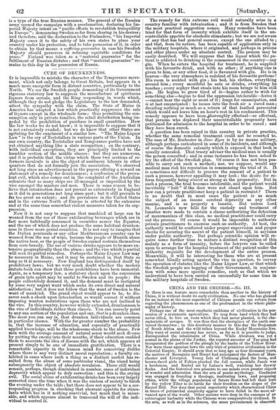RUSSIAN MATERIAL GUARANTEES.
THE method of Russia in extending her territory is, like the rules of art, to be gathered from her works. Two of the most striking stratagems by which she accomplishes her ends are those which may be called the " material guarantee" and the "no instruc- tions." The plan is, to have a dispute, and advance claims to oc- cupy a territory as a "material guarantee" for the fulfilment of those claims ; to proceed with negotiations on collateral points, while the agents are directed to plead " no instructions " for yield- ing the claims demanded on the other side. The treatment of Turkey now is exactly like that of Turkey in times past—exactly like that of Persia, or, in fact, of any country upon which Russia has encroached ; but in some instances the very succession of acts, or even the very terms of the Russian proceedings, have been identical.
Thus, about 1825, when Russia had a claim against Persia for certain lands of Kapan, the Russian army under General Yermo- loff seized a strip of land called Gokcheh, which had been in the undisputed possession of Persia ; that land was seized as a " pledge," and Russia offered to give it up if the lands of Kapan were immediately evacuated by Persia. The claim advanced was mainly on the strength of the treaty of Futteh Alec Khan, which the Shah of Persia had expressly refused to ratify. It will be re- membered that Russia's great grievance in Turkey is, that Turkey refuses to carry out in letter and spirit certain treaties, such as the treaties of Kainardji, which Russia herself has broken ; and yet here, more than a quarter of a century ago,_ we find her, who is so strict in exacting observance of treaty, advancing claims upon Persia on the strength of an unratified treaty. Prince Menschikoff, the same now distinguished in Turkey, went to the court of Persia to announce the accession of Nicholas, and to con- tinue the negotiations ; but when he was asked to give up the land of Gokcheh, he had "no instructions " ; and Russia remained in permanent possession. The process was just the same with Sweden, in 1808, when that power, under English patronage, was endeavouring to resist the encroachments of Alexander; and the occurrence may be a useful reminiscence not only to Sweden but to our own Ministers. In a last declaration transmitted to Stockholm, the Emperor Alexander required Sweden to abandon her neutrality and her English alli- ance. " His Imperial Majesty," says this document, " finds that the interest of his empire would be ill secured, if, when the con- test should commence between England and Russia, the King of Sweden, so near a neighbour of his states, should in the meanwhile attempt to cover, by an appearance of feigned neutrality, his known sentiments of attachment for England." "His Imperial Majesty could not leave Sweden in that vague position with regard to Rus- sia; he cannot, therefore, admit her neutrality." " The dispositions of the King have been taken ; and it only remains for his Imperial Majesty to recur without delay to all the means which Providence has afforded him for securing the safety of his empire." One of these means was for Sweden to join Russia and Denmark, inclosing the Baltic against England. Sweden, however, was not for complying; and Alexander took possession of? Finland. The plan of proceeding
is a type of the true Russian manner. The general of the Russian army opened the campaign with a proclamation, declaring his Im- perial Majesty intent on "pacific efforts to reestablish tranquillity in Europe "; denouncing Sweden as far from sharing in his desires; and therefore, said the declaration to the Finlanders, " his Imperial Majesty owes it to the safety of his own states to place your country under his protection, and to take possession of it, in order to obtain by that means a sufficing guarantee in case his Swedish Majesty should persevere in refusing equitable conditions for peace." Finland was taken as a " material guarantee " for the fulfilment of Russian dictates ; and that "material guarantee" re- mains to this day in the possession of Russia.



































 Previous page
Previous page